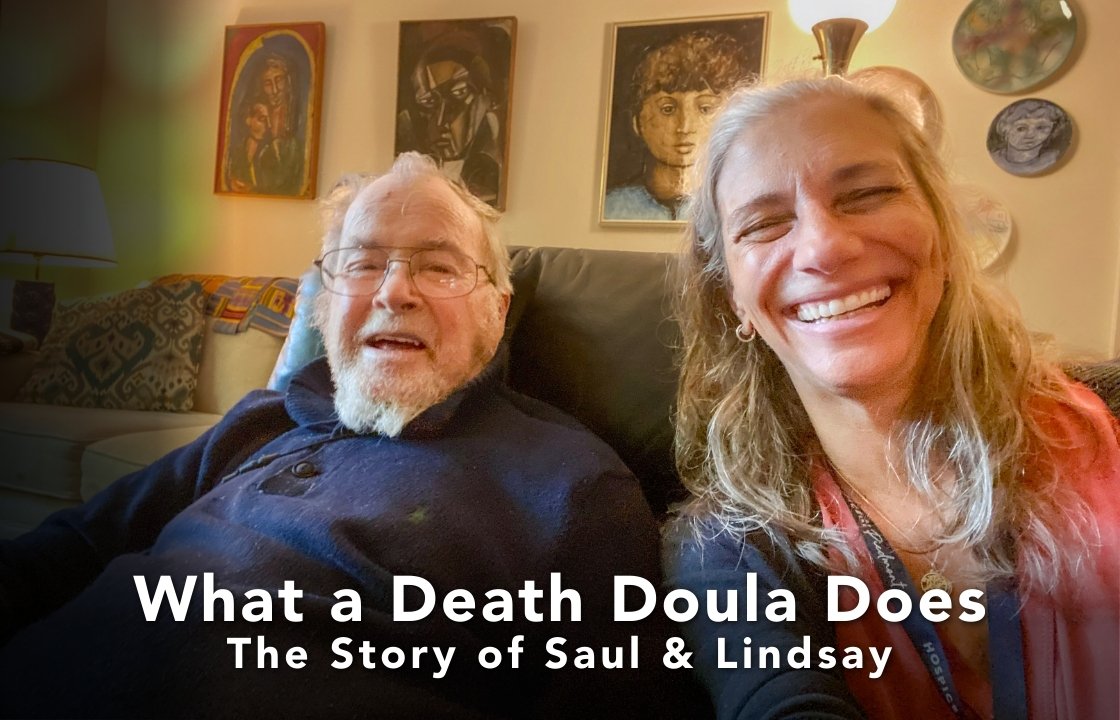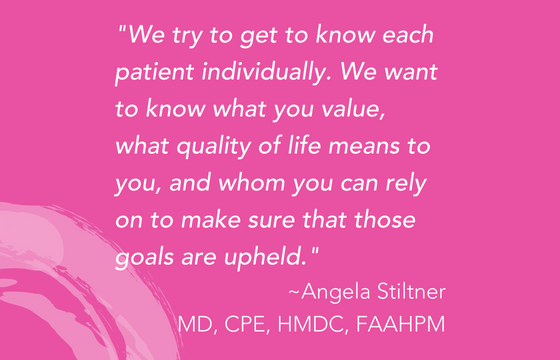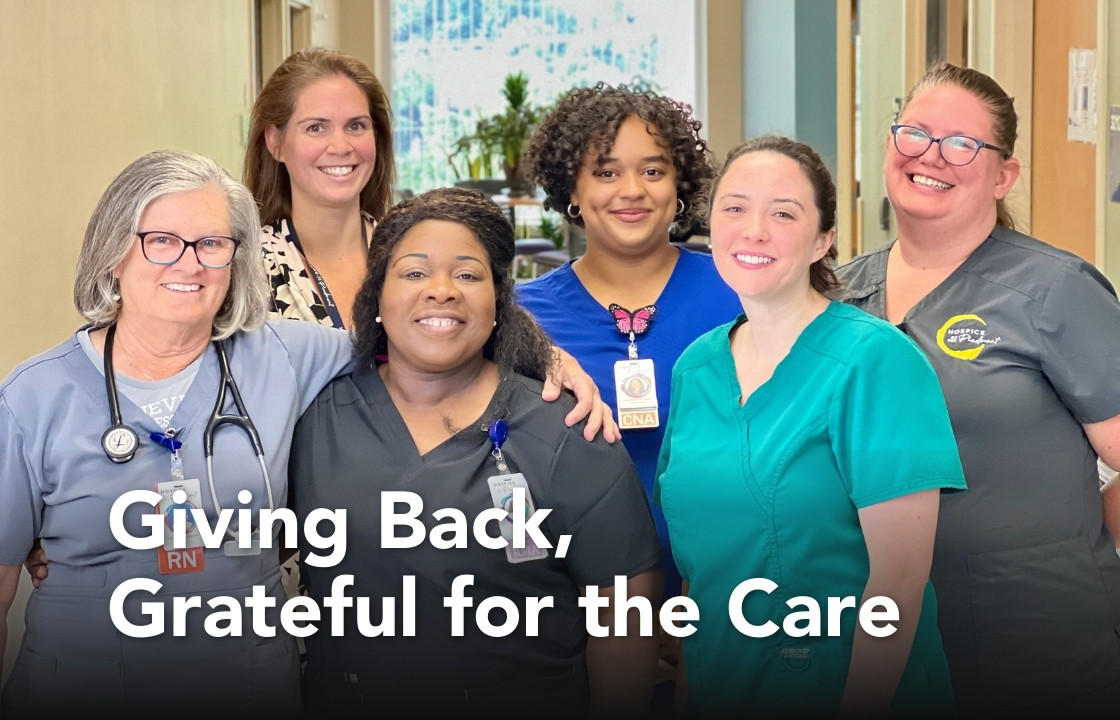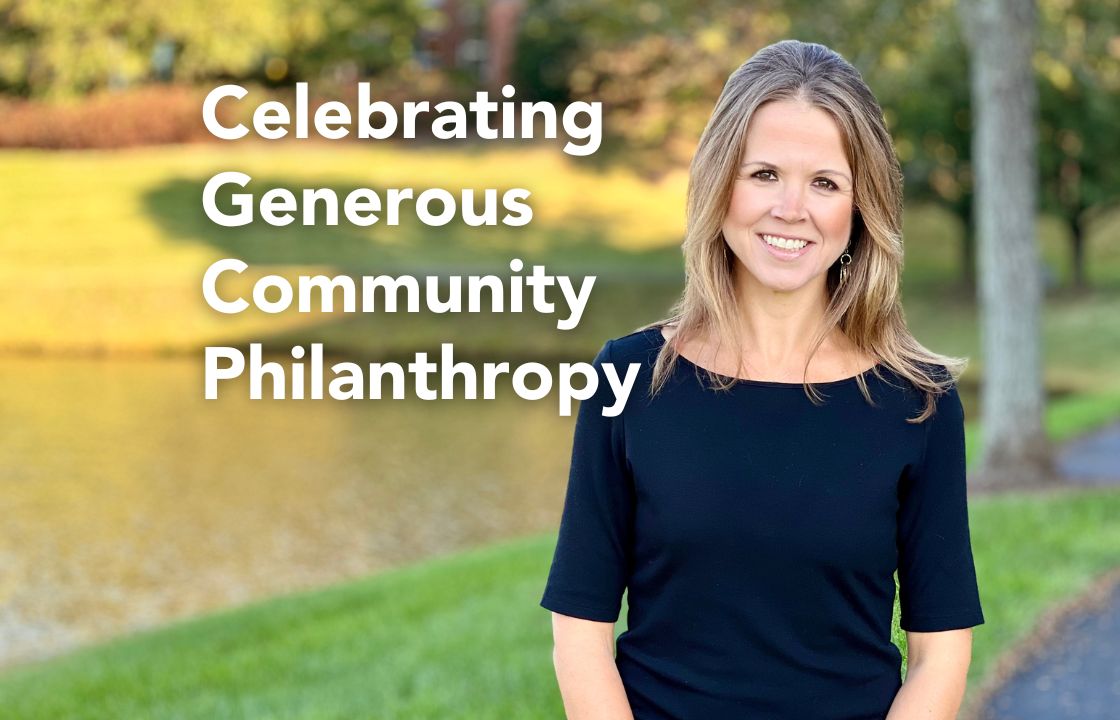“Death what? Death Dueler?”
Saul grins when he tells the story of the first time he heard Lindsay’s title. His New York accent turns doula into dueler as he mimes a fencing foil in the air. With his trademark wit, Saul makes the point. Not everyone knows what a Death Doula is, and Saul is the first to admit he didn’t either.
Lindsay remembers their first meeting fondly. “Saul is a kind and open person. He hadn’t heard of a Doula before, but when I said, ‘Here’s how I can support you,’ he seemed to catch on quickly.”
Lindsay is one of Hospice of the Piedmont’s volunteer Death Doulas. She met Saul through our Palliative Medicine program.
“When you meet someone at that kind of edge of their life, it’s going to be a new situation every time,” Lindsay said. “You just meet them with an open heart and an open mind, tell them how you can support them, and then listen.”
“Lindsay has removed what I consider the hidden elephant in our society: Death. We don’t accept it, but it’ll come,” Saul said.
Lindsay is matter-of-fact about the language she brings into the room. “When I explain my supports, I say ‘death.’ I’m very clear that I’m talking about the end of one’s life, and it’s very clear what I am supporting by using the language.”
At 96 and a half, Saul is similarly candid about his situation. “When it comes to death, most people have some kind of signal: a terminal disease. I have no terminal disease. There’s no structure. So, is this a game nature is playing with me?”
Lindsay puts it plainly. “The terminal illness he has is just life, right? It’s just being in a human body.”
Death Doulas are trained, non-medical members of the care team who guide patients and families through personal conversations and decisions. They offer a steady presence, help people reflect on their lives, support legacy projects, and facilitate planning so wishes are understood and honored.
This story is just one example of how Hospice of the Piedmont’s Death Doulas are making a difference in the lives of our patients.
—
Legacy Projects: Organizing a Life’s Work
Saul Kaplan was born in Brooklyn, NY, in 1929. In the late ’40s, he studied at the Hans Hofmann School of Fine Art and became well-known for his beautiful minimalist portraits and ceramics, which often explore intimacy and connection.
As an artist, Saul had boxes of drawings, paintings, and ceramics that carried decades of memory and meaning. They also carried weight.
Lindsay understood immediately. She is an artist, too.
“We talked about what will happen with all his art upon his death,” she said. “It was weighing him down on an emotional level, but also on a real physical level because he had all these objects and didn’t know what to do with them.”
They sat together and started to decide. What should go where? Who might value what? Which friend could help with logistics?
Now, a museum in Waynesboro is planning a retrospective of his work. “Ninety percent of my work went over there,” Saul said.
“Once he realized his work could go to a museum, you could just feel the lightness in the room,” said Lindsay.
For Saul, organizing his art brought peace. For others, legacy projects might look entirely different: creating a scrapbook, recording family stories, making a quilt, or writing letters to loved ones. Death Doulas help identify what matters most to each person and find a meaningful way to preserve it. Doulas help each person identify and preserve what matters most, because everyone has a legacy worth protecting.
—
Reflection and Presence in the Final Chapter
Their visits aren’t only about sorting and planning. A friend gave Saul The Book of Awakening by Mark Nepo, a daily reading on awareness. Reading it became part of their visits.
“When I last visited Saul, we read the passage for that day, and we just related it right back to death, dying, aging, loss, and transition,” Lindsay said.
For both Saul and Lindsay, these moments open the door to bigger conversations about meaning, purpose, and the ways we make sense of life as it changes. It’s the kind of mental stimulation Saul values, and the kind of connection that can make a day feel fuller.
“How do we live now, even though we may be facing the end of our lives?” Lindsay said. “How do we focus on now?”
Reading together is just one example of how a Death Doula can create space for reflection. For some, that space might mean talking about important life moments, asking deep questions, or simply sitting in quiet companionship. This intentional presence helps patients explore emotional and practical questions about their lives as needs and capabilities shift.
—
Planning and Advocacy: The Five Wishes Conversation
Talking about death is one thing. Putting wishes on paper is another. Lindsay introduced Saul to Five Wishes, a guide that helps people name who can speak for them if they cannot, the kind of care they do or do not want, and what matters to them beyond medicine.
“It took place over maybe three meetings,” Lindsay said. “We went through one by one and discussed them.”
Saul says he saw the value in the process. “You’re the dying person, but you must see it through the eyes of your family and other people. How are they going to perceive it? You’ve got to write down details that will help guide them.”
They later reviewed his wishes with his sons and grandchildren.
“It’s a structure,” Saul said. “And death needs a structure. It takes a lot of people off the hook.”
Helping patients plan and advocate for their wishes is a standard part of Death Doula work. That might include guiding someone through Five Wishes, assisting with advance directives, or facilitating conversations about funeral and memorial preferences. By helping to share those decisions with family and care teams, doulas ensure the person’s voice is heard, even when they can’t speak for themselves.
—
Making Room for Real Conversations
When friends saw Lindsay visiting, some assumed the worst.
“All of his friends thought, ‘Oh, there’s this hospice person there. Is he dying?” Lindsay recalls.
Saul had a line ready: “She’s organizing all my stuff. She’s planning my demise,” he would joke.
Lindsay would answer, “I am supporting you in preparing for the end of your life.”
Saul likes her candor. “She’s talking about death. Facing it. Which is very important. Everybody knows there’s going to be an end somehow. We talk about art and pleasure. She’s like a friend.”
He talks comfortably about his funeral now. “I’m 96 and a half. Who’s left to eulogize me anymore?” His hoarse, throaty laugh reverberates in the apartment.
“So many of my friends are gone,” he reflects. “I spent the other night thinking about what happened to all my tennis buddies. What happened to all my school buddies? I just kept saying, ‘Gone, gone, gone.’”
He pauses. Then says, “So, we get new kinds of relationships.”
A Death Doula is most certainly a new kind of relationship. They are there to serve as both a witness and companion, helping to make sense of what has been and face what’s to come with clarity, courage, and even laughter.
—
Work With a Death Doula
The Death Doula service is available at no cost to families receiving hospice or palliative care from Hospice of the Piedmont. To request a doula, discuss it with your HOP case manager or social worker.
Interested in becoming a Death Doula? Start with hospice volunteer onboarding and then complete a specialized 50-hour doula training course.



